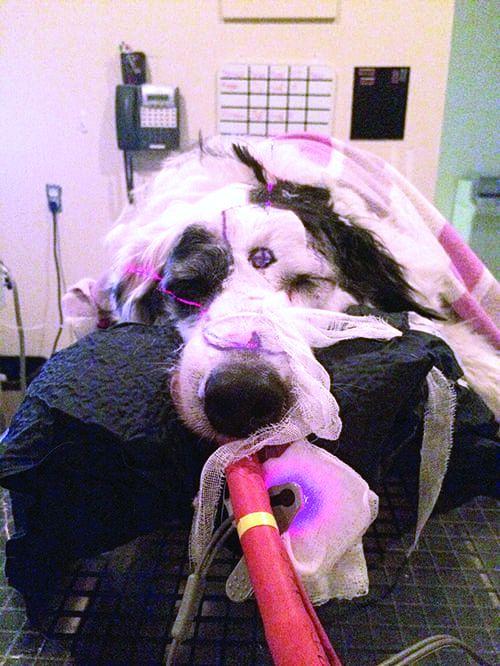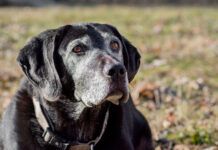
For each of the past six months, I’ve written an article for WDJ about the cancers that most commonly afflict dogs. It’s my sincere hope the articles will help any dog owners who find themselves in a fight for their own dogs’ lives understand what they are up against, learn about treatment protocols and median survival times, and where to find clinical trials for and cutting-edge research on the various cancers.
Gathering the information for the series took a huge amount of time and work, but it’s been a labor of love – a way of paying back the many dedicated, knowledgeable veterinary professionals who helped me get through the illnesses of my two previous dogs.
Unfortunately, both of my beloved dogs ultimately succumbed to their diseases. But we enjoyed many wonderful days together while we lived with cancer.
IT’S A PERSONAL FIGHT
My Border Collie, Daisy, was diagnosed in 2010 with transitional cell carcinoma, a rare form of cancer, accounting for about 2% of cancers that occur in dogs. I threw myself into researching the disease and treatments and was fortunate to have a group of amazing veterinary specialists on her team.
I was petrified prior to Daisy’s first treatment, but her primary veterinarian, Dr. Jeffrey Bryan, assured me that severe reactions were rare and this treatment would provide the best opportunity for an extended life span with good quality. My trust in her good doctors was not misplaced; Daisy lived with great quality of life for 2½ years after diagnosis, undergoing chemotherapy during most of that time (see “Chemotherapy Can Be Kind,” WDJ October 2011), even playing with a flying disc after every treatment.
Then, in 2015, my other Border Collie, Duncan, was diagnosed with nasal carcinoma – another rare form of cancer in dogs, accounting for about 1% of all canine neoplasia. It was inoperable, but radiation therapy provided the best chance at reducing the tumor size and providing an extending survival time.

Even after the experience with Daisy, radiation therapy frightened me: my 14-year-old dog had to be fully anesthetized every day for five days in a row to receive a therapeutic dose of radiation to his head. Duncan was a very sensitive soul; I worried about how these all-day experiences would affect him, not to mention the risks of all that anesthesia.
To my surprise and delight, Duncan enthusiastically embraced the daily road trips of two hours each way and adored his veterinary technician. He happily left me in the waiting room to go with her for treatment. I’d wait for hours in a bookstore, buying way too many books and drinking way too much tea.
At the end of the day I would pick him up and we would journey home. By the time we arrived home, he had completely recovered and was ready to play ball for hours (in his heaven, balls rain from the sky). He felt better after those radiation treatments than he had in the weeks prior. There is something to be said for the pain-relieving properties of radiation therapy.
We had hoped for a good year. We got a great month. Yes, I would do it again in a heartbeat.
NOT FOR THE FAINT OF HEART
I have to admit that the research for this series left me discouraged; 50 years of scientific investigation into cancer has resulted in only moderately improved treatments – options that, sometimes, extend patients’ lives for just a few months at sometimes incredible cost (physical, emotional, financial).
For perspective, I turned to someone who has been studying, researching, and treating canine cancer for more than 15 years, Jeffrey Bryan, DVM, PhD, DACVIM Oncology – yes, the same person I was lucky to have as my dogs’ first vet. Dr. Bryan is no longer in private practice, having long since decamped for research and academia. He is now a professor of oncology at the University of Missouri’s College of Veterinary Medicine, and director for the school’s Comparative Oncology and Epigenetics Laboratory. When I first met Dr. Bryan, he was working in a veterinary practice in San Francisco. He impressed me with his warmth and knowledge way back when, and he’s only gotten warmer and more knowledgeable with time in this challenging field.
I asked Dr. Bryan whether he still feels hopeful about treating canine cancer, and he said he absolutely does. “What gives me hope is the fact that we make progress every year,” he told me. “I watch brilliant young clinicians and researchers become attracted to oncology every year, making me optimistic for creative new solutions. Companies come along with new approaches to treating cancer all the time. Some of these work very well.”

Dr. Bryan reminded me, however, that it’s fruitless to hope for the “end” of cancer. “Cancer will always be with us, I’m afraid,” he says. “It’s an evolutionary disease. We need to continue to get better at recognizing it early, addressing it comfortably, and fitting the most effective treatment to each patient.”
Dr. Bryan’s observations reflect some of the newest approaches to cancer treatment, whether it be for humans or canines. Some researchers are moving toward reframing cancer as a chronic illness, one where patients can coexist with cancer cells (as long as the cancer is prevented from growing unchecked). It is hoped that new diagnostics can be developed to provide the earliest identification possible and then eradicate cancerous cells at inception, thereby preventing them from developing into an untreatable malignancy.
As depressed as I am about the prevalence of canine cancer, I do find hope in the work of Dr. Bryan and all of his colleagues working in the specialty of veterinary oncology. Remarkable advances have been made in treating our canine companions, supported by the developments in affiliated fields such as imaging, rehabilitation, pain management, and pharmacology. Advances in the fields of palliative care and immunotherapy have grown exponentially; the latter is especially promising.
A FEW MORE CANINE RESOURCES
In my five previous articles, I described the latest diagnostic tools and treatments for the most common canine cancers: mast cell tumors (July 2019), osteosarcoma (August), lymphoma (September), melanoma (October), and hemangiosarcoma (November).
There are myriad resources available to learn more about canine cancer – the above-mentioned types and others that we have not written about – and this information, like the disease itself, is constantly changing.
If your dog (like my two Border Collies) is diagnosed with an uncommon type, an internet search will bring up a multitude of results; do research but be discerning in your approach. Look for reputable sources and scientific support for any claims. Many veterinary colleges and specialty clinics have websites with sections for pet owners to learn more about various diseases and treatments; these are credible sources for information. Below, you’ll find some more starting points for reliable information.
Veterinary oncology specialists. While an experienced general veterinary practitioner who has a special interest in canine cancer will be a huge asset to you, I can’t recommend it strongly enough that you seek out help from a board-certified veterinary oncologist.
These specialists have received extensive oncology training after veterinary school, passed examinations, and completed publication requirements to receive certification by the American College of Veterinary Internal Medicine (ACVIM). When they become certified in oncology by the ACVIM, they will add the letters DACVIM after their names (the “D” is for Diplomate).
You can use a feature on the ACVIM website to search for board-certified veterinary specialists (find.vetspecialists.com). If there are no oncology specialists in your area, your veterinarian should be able to consult with specialists located farther afield to develop an appropriate treatment plan for your dog.
Clinical Trials. In order to improve detection and treatment of disease, the most promising experimental or investigational therapies need to be tested in clinical trials. The safety and efficacy of these therapies and procedures have often been evaluated first in laboratory animals and the therapy is considered to be of potential benefit to the patient. Your dog may or may not benefit from participation in a clinical trial, but these studies advance veterinary science and have the potential to improve the outcomes of future generations of dogs.
The American Veterinary Medical Association (AVMA) maintains the AVMA Animal Health Studies Database, which provides information on veterinary clinical trials reported by researchers. Searches for relevant studies can be done using the parameters of diagnosis, location, species, and field of veterinary medicine (such as oncology). See ebusiness.avma.org/aahsd/study_search.aspx.
The American Kennel Club Canine Health Foundation funds scientific research with the goal of improving the health of dogs. For a link to the trials they fund, see akcchf.org/research/participate-in-research/clinical-trials.html.
In addition, the Veterinary Cancer Society website maintains a page with links to many of the organizations that offer veterinary clinical trials. See vetcancersociety.org/pet-owners/clinical-trials/.
Books. There are a number of books that are very helpful for advancing your understanding of canine cancer. My favorites are:
- The Dog Cancer Survival Guide, by Demian Dressler, DVM, with Susan Ettinger, DVM, DACVIM Oncology (Maui Media, 2011). A comprehensive guide for practical, evidence-based approaches to canine cancers, including conventional, integrative, and alternative treatment options, supportive care, financial considerations, and resources to help owners optimize lifespan and quality of life.
- Speaking for Spot: Be the Advocate Your Dog Needs to Live a Happy, Healthy, Longer Life, by Nancy Kay, DVM (Trafalgar Square Books, 2008). An invaluable resource for pet owners to help navigate veterinary care and decisions.
- The Emperor of All Maladies: A Biography of Cancer, by Siddhartha Mukherjee (Scribner, 2010). The quintessential book about cancer – its history, discoveries, setbacks, treatments, and hopes for the future.
- The First Cell and the Human Costs of Pursuing Cancer to the Last, by Azra Raza (Hatchette Book Group, 2019). An exploration of the cancer “industry” and a call for change in research and treatment.
Websites. There is no shortage of sites with information about canine cancer. The list of sites with up-to-date, credible, understandable information is shorter. These are a few of my recommended sources of information for pet owners.
- drsuecancervet.com and facebook.com/DrSueCancerVet. Dr. Sue Ettinger is a practicing veterinarian and board-certified cancer specialist, international speaker, book author, and vlogger (video blogger). Her information is up-to-date and extremely accessible.
- dogcancerblog.com. A great resource covering everything from the latest in cancer news to resources to comprehensive articles, featuring Dr. Demian Dressler and Dr. Susan Ettinger, authors of The Dog Cancer Survival Guide.
- morrisanimalfoundation.org. The Morris Animal Foundation bridges science and resources to advance the health of animals. The foundation is at the forefront of funding cancer studies in dogs, including the Golden Retriever Lifetime Study, one of the largest, most comprehensive prospective canine health studies in the United States. The study’s purpose is to identify the nutritional, environmental, lifestyle, and genetic risk factors for cancer and other diseases in dogs.
- ccr.cancer.gov/Comparative-Oncology-Program. The Center for Cancer Research is a division of the National Cancer Institute under the National Institutes of Health. In 2003, the Comparative Oncology Program was launched to aid research in furthering the understanding of cancer and improving the assessment of treatments for humans by treating companion animals. Comparative oncology is the study of naturally developing cancers in animals as models for human disease. Through these trials, pets gain access to cutting edge research and therapeutics; the results then support the further development of human clinical trials. The site also provides disease information, links to clinical trials, news, and publications.
- wearethecure.org/tag/pet-cancer/. This site has a “Canine Cancer Library” that provides detailed information on an ever-expanding list of types of cancers. The Foundation’s blog presents latest canine cancer news and related stories.
- merckvetmanual.com/special-pet-topics/cancer-and-tumors. General veterinary information about cancer in pets.
- scholar.google.com. An easy-to-use free search engine that accesses the full text or metadata of scholarly literature across an array of publishing formats and disciplines; a great resource to look for published research on canine cancers.
HOLISTIC (INTEGRATIVE) VETERINARY CARE
In all the articles about canine cancer published here, I never had an opportunity to discuss holistic care for dogs undergoing treatment for cancer. It’s a huge topic, and one I hope to write about in a future issue.

Holistic veterinarians embrace a broad approach to care, not only examining the patient, but also the patient’s environment, behavior, relationships, and disease patterns. Veterinarians who self-identify as holistic, integrative, or complementary may have a variety of educational experiences and training; they may augment their conventional veterinary medicine with chiropractic, acupuncture, herbs, and/or other modalities. Their treatment protocols, then, will depend on their education, training, and experience.
Note: Veterinarians who identify as offering “alternative” medicine might not use conventional veterinary medicine or collaborate with conventional veterinary practitioners. Make sure you are clear about what they do and don’t offer.
My primary veterinarian is a holistic practitioner and was a valuable member of Daisy’s team. Throughout Daisy’s illness, he supported her with acupuncture, low level light therapy, nutrition, and medicinal herbs. He worked closely with her oncologist to ensure safe and beneficial integrative care. Complementary therapies can be of great benefit to pets with cancer, and holistic veterinarians can help create these personalized support plans.
To locate a holistic veterinarian near you, visit the website of the American Holistic Veterinary Medical Association, a group of member veterinarians and allies who are elevating the veterinary profession through innovation, education, and advocacy of integrative medicine. Go to ahvma.org/find-a-holistic-veterinarian.
FINANCIAL ASSISTANCE
One last resource – an important one. Most cancer treatments for dogs are expensive, as are the diagnostics and supportive care. I was fortunate; at the time when my dogs were stricken, I had the funds to treat both of my dogs. I don’t have those financial resources now, but I do have pet insurance for my current dogs.
If you have neither the funds nor pet insurance, there are a number of financial resources available for dogs with cancer; the Humane Society of the United States keeps a current list of national and state-specific pet financial aid organizations at the following page: humanesociety.org/resources/are-you-having-trouble-affording-your-pet.
AGAIN: IT’S PERSONAL
The decision to treat (or not treat) a pet for cancer is a personal decision; there is no right or wrong approach. Cancers are a group of very complicated and diverse diseases with each oncology case being medically unique. I opted to treat both of my dogs and I was fortunate to have gained more time with them. More time to eat ice cream together. To play ball and Frisbee. To cuddle on the sofa. To share synchronized breathing while falling asleep together. To dream together. Every moment is a gift.






This article was right on.
I just said Goodbye to my 9 yr old GSD Niki in Aug, spleen tumor, fluid around lungs, abdominal bleeding.
NOW my 11 yr GSD Titan diagnosed with Nasal Squamous Cell Carcinoma. Surgery would deform his nostrils/muzzle. Which we chose not to do. With really no guarantees of long term success.
1 Radiation plan gave possibly 25 % & another plan gave possibly 10%.
We have decided to go with End of Life(Hospice, if you will). It was hard with Niki but Titan(Niki helped, also) got me started in K9 training. He is very obedient, great in Protection & Detection, but Very Affectionate. He wishes there were 28 hours in a day, he is so energetic. He puts items in the trash, he has to help with laundry.
Niki was kind of laid back, “Let Titan do it.” Lol. I was ok with that, each has their own personality.
He really is my BFF!
I’m really gonna miss him.
At 63, as of now I won’t get another K9. I will enjoy the company of my clients BFF.
Thank you!
Look into True beam radiation or cyberknife radiation for your dog. I had my cat treated for a deep brain pituitary brain tumor and he’s still alive and doing well 3 yrs since his treatment and I believe they baked his brain tumor and that it’s not coming back. He’s doing amazing. We went to the Cyberknife veterinary Clinic in Malvern, PA. They never answer their phone so leave a message and they’ll call you back. There’s also True Beam at a vet office in Yonkers NY and Angell at Tufts has True Beam radiation in MA. I know that they treat dog nasal cancer and have had amazing results.
Dogs did not used to get so much of these serious maladies, and back then their food was not as good and they were less pampered and cared for. Vaccines probably cause some of the increase. I no longer have a dog over this issue.
Back in the day, Gravity, who was a stray on the street, had severe past injuries, got cancer ‘all over.’ A holistic vet prescribed all kinds of powders and a diet of raw heart meat and no carbs. She got some in treats. Gravity lived a year with great quality of life until one day she let me know she wanted normal food (still heart meat) – no more heap of powder. Gravity the Great.
Thank you for the honest story and all the useful links. My border collie/german shepard is 14 and 1/2 and does not have cancer-I found a bump but it hasn’t grown, but I am watching it! He does have terrible arthritis and a sensitive stomach. I really appreciate your resources and your discussion of holistic care.
I have been looking into healthy food options. I met someone who uses Buddy Custard food supplement-that is Flax Seed oil and cottage cheese and has no drugs or artificial ingredients. Has anyone used this food supplement or tried flax seed or found other natural foods to help with health?
Thank you.